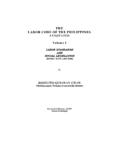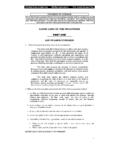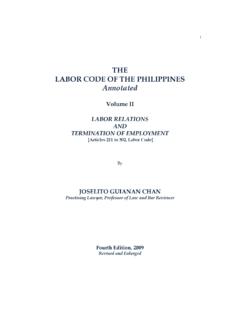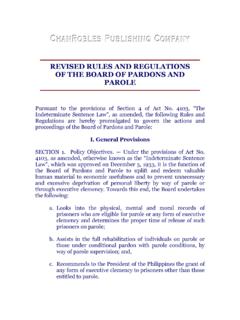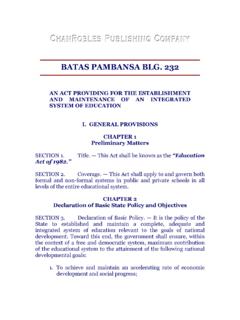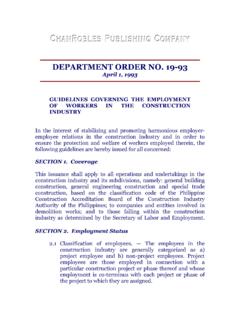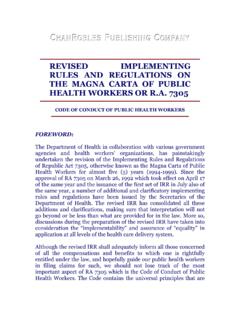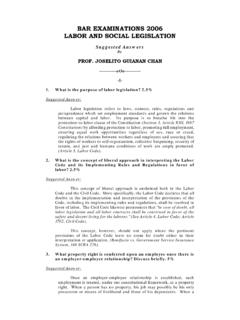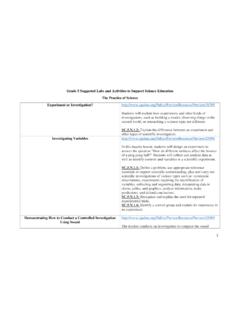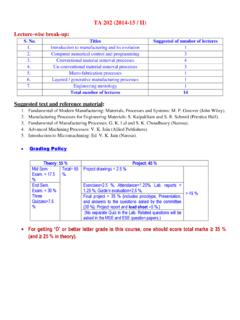Transcription of LABOR AND SOCIAL LEGISLATION - chanrobles.com
1 BAR EXAMINATIONS 2006 LABOR AND SOCIAL LEGISLATION suggested answers By PROF. JOSELITO GUIANAN CHAN -----------oOo---------- -I- 1. What is the purpose of LABOR LEGISLATION ? suggested Answer: LABOR LEGISLATION refers to laws, statutes, rules, regulations and jurisprudence which set employment standards and govern the relations between capital and LABOR . Its purpose is to breathe life into the protection-to- LABOR clause of the Constitution (Section 3, Article XIII, 1987 Constitution) by affording protection to LABOR , promoting full employment, ensuring equal work opportunities regardless of sex, race or creed, regulating the relations between workers and employers and assuring that the rights of workers to self-organization, collective bargaining, security of tenure, and just and humane conditions of work are amply protected.
2 (Article 3, LABOR Code). 2. What is the concept of liberal approach in interpreting the LABOR Code and its Implementing Rules and Regulations in favor of LABOR ? suggested Answer: This concept of liberal approach is enshrined both in the LABOR Code and the Civil Code. More specifically, the LABOR Code declares that all doubts in the implementation and interpretation of the provisions of the Code, including its implementing rules and regulations, shall be resolved in favor of LABOR . The Civil Code likewise pronounces that in case of doubt, all LABOR LEGISLATION and all LABOR contracts shall be construed in favor of the safety and decent living for the laborer. (See Article 4, LABOR Code; Article 1702, Civil Code). This concept, however, should not apply where the pertinent provisions of the LABOR Code leave no room for doubt either in their interpretation or application.
3 (Bonifacio vs. Government Service Insurance System, 146 SCRA 276). 3. What property right is conferred upon an employee once there is an employer-employee relationship? Discuss briefly. 5% suggested Answer: Once an employer-employee relationship is established, such employment is treated, under our constitutional framework, as a property right. When a person has no property, his job may possibly be his only possession or means of livelihood and those of his dependents. When a 2006 Bar Examinations in LABOR Law suggested answers Prof. Joselito Guianan Chan person loses his job, his dependents suffer as well. The worker should, therefore, be protected and insulated against any arbitrary deprivation of his job. (Philips Semiconductors [Phils.], Inc. vs. Fadriquela, G.)
4 R. No. 141717, April 14, 2004; Philippine Geothermal, Inc. vs. NLRC, 189 SCRA 211 [1990]). -II- Wonder Travel and Tours Agency (WTTA) is a well known travel agency and an authorized sales agent of the Philippine Air Lines. Since majority of its passengers are overseas workers, WITA applied for a license for recruitment and placement activities. It stated in its application that its purpose is not for profit but to help Filipinos find employment abroad. Should the application be approved? 5% suggested Answer: The application should not be approved for the simple reason that the law categorically declares that travel agencies and sales agencies of airline companies are prohibited from engaging in the business of recruitment and placement of workers for overseas employment, whether for profit or not.
5 (Article 26 of the LABOR Code). It is, therefore, of no consequence that its purpose is not for profit but to help Filipinos find employment abroad. (Note: It must be stressed that the POEA Rules disqualify not only travel agencies and sales agencies of airline companies but also the following, to wit: a. Officers or members of the Board of any corporation or members in a partnership engaged in the business of a travel agency; and b. Corporations and partnerships, when any of its officers, members of the board or partners, is also an officer, member of the board or partner of a corporation or partnership engaged in the business of a travel agency. (Section 2, Rule I, Part II, POEA Rules and Regulations Governing the Recruitment and Employment of Land-Based Overseas Workers [February 4, 2002]; Section 2, Rule I, Part II, POEA Rules and Regulations Governing the Recruitment and Employment of Seafarers [May 23, 2003]).)
6 -III- Can an overseas worker refuse to remit his earnings to his dependents and deposit the same in the country where he works to gain more interests? Explain. 5% suggested Answer: No, such refusal to remit his earnings to his dependents is not allowed under the law which considers mandatory for all Filipino workers abroad to remit a portion of their foreign exchange earnings to their families, dependents, and/or beneficiaries in the country in accordance 22006 Bar Examinations in LABOR Law suggested answers Prof. Joselito Guianan Chan with rules and regulations prescribed by the Secretary of LABOR . (Article 22 of the LABOR Code) The reason for this mandatory requirement is to protect the welfare of families, dependents and beneficiaries and to ensure that the foreign exchange earnings of these workers are remitted through authorized financial institutions of the Philippine government in line with the country s economic development program.
7 Non-compliance with the laws and regulations on remittance of foreign exchange earnings and recourse to the use of unauthorized and unofficial financing institutions had led to the detriment of the country s balance of payments and economic development program. Consequently, it is imperative that the mandatory remittance requirement be fully complied with by all concerned through the institution of appropriate remittance facilities and the imposition of effective sanctions. ( Whereas clauses, Executive Order No. 857; Section 2, Rule XIII, Book I, Rules to Implement the LABOR Code; Section 1, Executive Order No. 857; Section 2, Rule III, Rules and Regulations Implementing Executive Order No. 857). -IV- For humanitarian reasons, a bank hired several handicapped workers to count and sort out currencies.
8 Their employment contract was for six (6) months. The bank terminated their employment on the ground that their contract has expired prompting them to file with the LABOR Arbiter a complaint for illegal dismissal. Will their action prosper? 5% suggested Answer: No, the complaint will not prosper because what they entered into was a valid fixed-term employment contract for six (6) months. Upon the expiration of the contract, there is no more employment relationship to speak of. Under the law, it does not necessarily follow that where the duties of the employee consist of activities usually necessary or desirable in the usual business of the employer, the parties are forbidden from agreeing on a period of time for the performance of such activities. There is thus nothing essentially contradictory between a definite period of employment and the nature of the employee s duties.
9 (Article 280, LABOR Code; Pangilinan vs. General Milling Corporation, G. R. No. 149329, July 12, 2004; St. Theresa s School of Novaliches Foundation vs. NLRC, G. R. No. 122955, April 15, 1998). It must be stressed that the validity of fixed-term contracts will be upheld for as long as the fixed period of employment was knowingly and voluntarily agreed upon by the parties, without any force, duress or improper pressure being brought to bear upon the employee and absent any other circumstances vitiating his consent or it satisfactorily appears that the employer and employee dealt with each other on more or less equal terms with no moral dominance whatever being exercised by the former on the latter. (Philips Semiconductors [Phils.], Inc. vs. Fadriquela, G.)
10 R. No. 141717, April 14, 2004; Medenilla vs. Philippine Veterans Bank, G. R. No. 127673, March 13, 2000). -V- 32006 Bar Examinations in LABOR Law suggested answers Prof. Joselito Guianan Chan Can an employer and an employee enter into an agreement reducing or increasing the minimum percentage provided for night differential pay, overtime pay, and premium pay? 5% suggested Answer: While as a general rule, the parties may enter into any kind of stipulation in a contract and the same shall be considered as the law between them, however, it must be emphasized that a LABOR contract is not an ordinary contract since it is impressed with public interest. Thus, the parties are prohibited to enter into any stipulation which may result in the reduction of any employee benefits.
